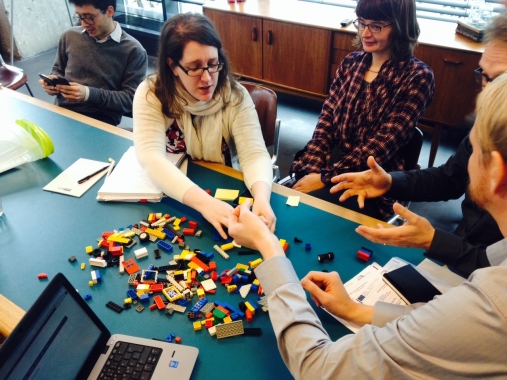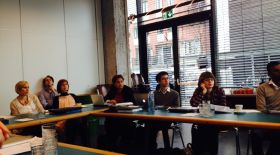Co-producing support services
Report from a workshop on co-production
Amsterdam, 17 February 2015 | Social
“Co-production is about reflecting upon the way you’re working- the obstacle is a path, if you consider this a journey”
Co-production is a philosophy and a concept at the very core of the ELOSH project and all partners involved are currently working at national level to tackle a series of challenges to implement these values in their way of working in the best way possible. As shared key challenges had been recognized the deep understanding of the concept as well as overcoming practical barriers such as deadlines and lack of resources.
Miro Griffiths of Miro Consultancy, recognised for specialising and having a keen interest in disabled people’s empowerment and participation, facilitated a co-production workshop in Amsterdam- as side event of the transpartnership meeting- that guided participants all the way from the theory and the background to the actual co-production practices.
Two are the key figures behind the concept of co-production. The term ‘co-production’ was originally coined in the late 1970s by Elinor Ostrom and colleagues at Indiana University to explain why neighbourhood crime rates went up in Chicago when the city’s police officers retreated from the beat into cars. Edgar Cahn reframed the concept utilising TimeBanking to specify the elements involved in transforming clients from passive consumers to active co-producers of outcomes. Cahn has also set the 4 key principles of co-production back in 2000:
- Recognising people as assets
- Valuing work differently
- Promoting reciprocity
- Building social networks
After the first theoretical part and after meeting the founders of co-production, participants had the chance to indeed co-produce in small groups by tackling the… Lego Challenges. The popular small colourful plastic bricks were used to reveal all small barriers towards actual co-production. In the exchange that followed the activity partners highlighted that:
- Co-production is time demanding within the real context of provision of services
- Co-production should not be sacrificed in light of pressure from deadlines. It is indeed challenging to strike a balance between time limits and actual co-production
- Co-production normally requires more resources
- Co-production on the one hand needs to recognize where you are in terms of skills while on the other hand you are not labelled by your role
The second part of the workshop evolved around two videos that offered a deep but also amusing analysis of co-production. The Parable of the Blobs and Squares underlined that co-production is all about putting process and context at equal value to work together, meaning to recognize the added value each side can bring.
Through the contradiction between “Serviceland and Togethertown” that were presented in the video Experiences of Social Care, partners identified two totally different models of treating people who use support services. The concrete outcome after the second part of the workshop was the outline of a vision for support services that is based on:
- Respect
- Opportunity given to reach the full potential
- Empowerment
- Understanding of role
Provided that these four principles are followed then each organisation may make 4 crucial steps in the way it is structured and operates: away from controlling to empowering, away from regulating to enabling, from planning to delegating and from initiating to self-regulating. In other words, this is the way to co-produce the support services together with the ones who make use of them.

Leave comments